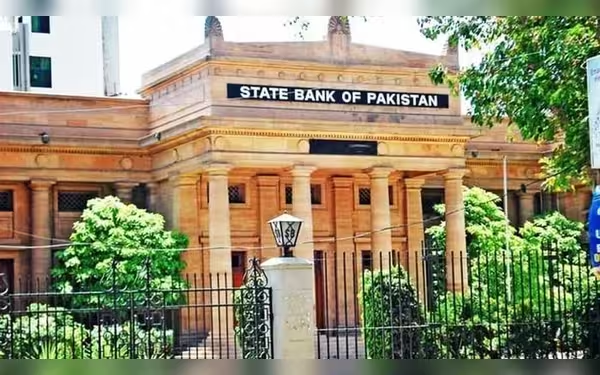Thursday, July 4, 2024 07:16 PM
State Bank of Pakistan reports positive macroeconomic developments
- Real GDP growth of 1.7% driven by agriculture sector
- Projected GDP growth of 2 to 3% for fiscal year
- Challenges include high inflation levels and structural issues
 Image Credits: thefinancialdaily
Image Credits: thefinancialdailyThe State Bank of Pakistan reports positive macroeconomic developments in the first half of fiscal year 2023-24, with real GDP growth driven by the agriculture sector. Challenges such as high inflation levels and structural issues persist, highlighting the need for policy reforms and sustainable development.
In the first half of fiscal year 2023-24, the State Bank of Pakistan (SBP) has reported positive developments in Pakistan's macroeconomic landscape. Real GDP saw a growth of 1.7%, primarily fueled by the agriculture sector. The SBP has projected a further real GDP growth of 2 to 3% for the entire fiscal year, attributing this to enhanced business confidence and positive demand indicators.
One of the key factors contributing to this improvement is the Stand-By Arrangement (SBA) with the IMF, which has eased external borrowing constraints and resulted in increased financial inflows. The current account deficit is anticipated to range between 0.5 to 1.5% of GDP for FY24, lower than previous estimates, supported by the growth in exports and remittances.
Noteworthy achievements in the first half of FY24 include a narrowing current account deficit, augmented foreign exchange reserves, and a surplus in the primary balance. However, inflation levels have remained high due to factors such as increased input costs and indirect taxes.
The SBP aims to curb inflation by targeting an average NCPI inflation of 23.0 to 25% for FY24. Despite these positive indicators, structural challenges like limited savings, weak productivity, and a narrow tax base continue to impede the country's economic recovery.
The report underscores the necessity for policy reforms to ensure sustainable development in the long run. It also suggests that reducing political and policy uncertainties, coupled with fiscal consolidation, could aid in lowering inflation in the short term.
While progress has been made, the SBP warns that the macroeconomic outlook remains susceptible to geopolitical tensions, adverse weather conditions, and fluctuations in global oil prices. Addressing structural issues and maintaining stable inflation without exerting excessive pressure on monetary policy are crucial priorities for ensuring long-term economic stability.
The recent improvements in Pakistan's macroeconomic conditions offer a promising outlook for the country's economic growth. By addressing key challenges and implementing necessary reforms, Pakistan can strive towards sustained development and stability in the future.













